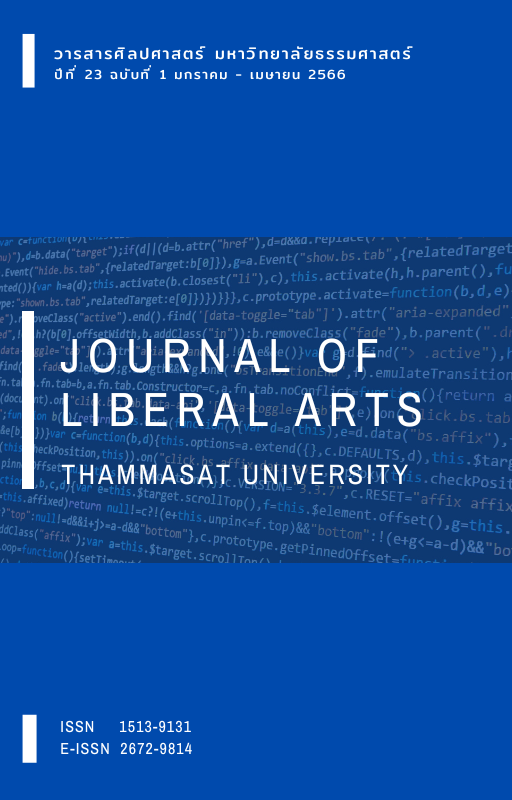การจัดการของรัฐต่อปัญหาประทุษวาจาทางศาสนาท่ามกลางความหลากหลายทางศาสนาของประเทศมาเลเซีย
Main Article Content
บทคัดย่อ
การศึกษาวิจัย เรื่อง การจัดการของรัฐต่อปัญหาประทุษวาจาทางศาสนาท่ามกลางความหลากหลายทางศาสนาของประเทศ เป็นการวิจัยเชิงคุณภาพ (Qualitative research) โดยการสัมภาษณ์และศึกษาวิจัยเอกสาร (Documentary research) ซึ่งเป็นการเก็บรวบรวมข้อมูลในระดับปฐมภูมิ และข้อมูลในระดับทุติยภูมิ ผลการวิจัย พบว่า 1) เสรีภาพทางศาสนาในมาเลเซียมิได้เป็นไปตามหลักการสิทธิเสรีภาพในการแสดงออกที่ถือเป็นจริยธรรมสากล อันเนื่องจากระบบกฎหมายและโครงสร้างอำนาจของรัฐที่ให้ความสำคัญกับความมั่นคงของศาสนาประจำชาติ ในขณะที่กฎหมายและองค์กรรัฐ ที่บังคับใช้กฎหมายในการควบคุมการเผยแผ่ศาสนา เป็นระบบกฎหมายคู่ขนาน และมีกลไกรัฐหรือองค์กรที่ออกและบังคับใช้กฎหมายที่สร้างความเหลื่อมล้ำระหว่างศาสนิกชน 2) การนำแนวทางการควบคุมประทุษวาจาตามแบบของประเทศมาเลเซียมาใช้กับสังคมมุสลิมในประเทศไทย มีปัญหาในเชิงมโนทัศน์ คือ เป็นการใช้อำนาจที่ขัดกับหลักเสรีภาพและละเมิดสิทธิเสรีภาพของประชาชน และมีปัญหาในเชิงปฏิบัติ คือ โครงสร้างกฎหมาย องค์กรที่เป็นกลไกของรัฐ โครงสร้างประชากรของมุสลิมในประเทศไทย ไม่รองรับต่อการใช้ระเบียบกฎหมายแบบมาเลเซีย 3) ในการแก้ปัญหาประทุษวาจาข้ามชุมชนทางศาสนา จำเป็นต้องใช้ระบบจริยธรรมสากลที่ยึดถือกลไกสิทธิเป็นบรรทัดฐานร่วมกัน
Downloads
Article Details

อนุญาตภายใต้เงื่อนไข Creative Commons Attribution-NonCommercial-NoDerivatives 4.0 International License.
เอกสารอ้างอิง
Abdullah, M. (2010). Nasib Malayu di Bumi Melayu. Utusan Publications & Distributors Sdn Bhd.
Ahmad, M. (2003). Pengajian Islam. Penerbit Universiti Malaya.
Ali, S. (2008). Ethnic Relations in Malaysia: Harmony & Conflict. Utusan Malaysia.
Feener, R. M. (2014). Official religions, state secularisms, and the structures of religious pluralism. In J. Finucane & R. M. Feener (Eds.), Proselytizing and the Limits of Religious Pluralism in Contemporary Asia (pp. 1-16). Springer.
India Today. (2019, August 20). Islamic preacher Zakir Naik banned from giving public speeches in Malaysia. https://www.indiatoday.in/india/story/islamic-preacher-zakir-naik-banned-from-giving-speeches-in-malaysia-1582531-2019-08-20
International Standards – I 1. (n.d.). Freedom of Religion or Belief. http://www.ohchr.org/EN/Issues/FreedomReligion/Pages/IStandardsI1.aspx
Lemière, S. (2014). Conversion and Controversy: Reshaping the Boundaries of Malaysian Pluralism. In J. Finucane & R. M. Feener (Eds.), Proselytizing and the Limits of Religious Pluralism in Contemporary Asia (pp. 41-64). Springer.
Malik, M. (2011). Religious Freedom, Free Speech and Equality: Conflict or Cohesion? Res Publica, 17(1), 21-40.
Mårtensson, U. (2014). Hate Speech and Dialogue in Norway: Muslims Speak Back. Journal of Ethnic and Migration Studies, 40(2), 230-248.
Maussen, M., & Grillo, R. (2014). Regulation of Speech in Multicultural Societies: Introduction. Journal of Ethnic and Migration Studies, 40(2), 174-193.
Morrell, K. (2012) What Is ‘Public Interest’?: A Case Study. In K. Morrell (Ed.), Organization, Society and Politics (pp. 162-181). Palgrave Macmillan.
Temperman, J. (2011). Freedom of Expression and Religious Sensitivities in Pluralist Societies: Facing the Challenge of Extreme Speech. Brigham Young University Law Review, 2011(3), 729-757.
Woolf, L. M., & Hulsizer, M. R. (2004). Hate groups for dummies: How to build a successful hate-group. Humanity & Society, 28(1), 40-62.


